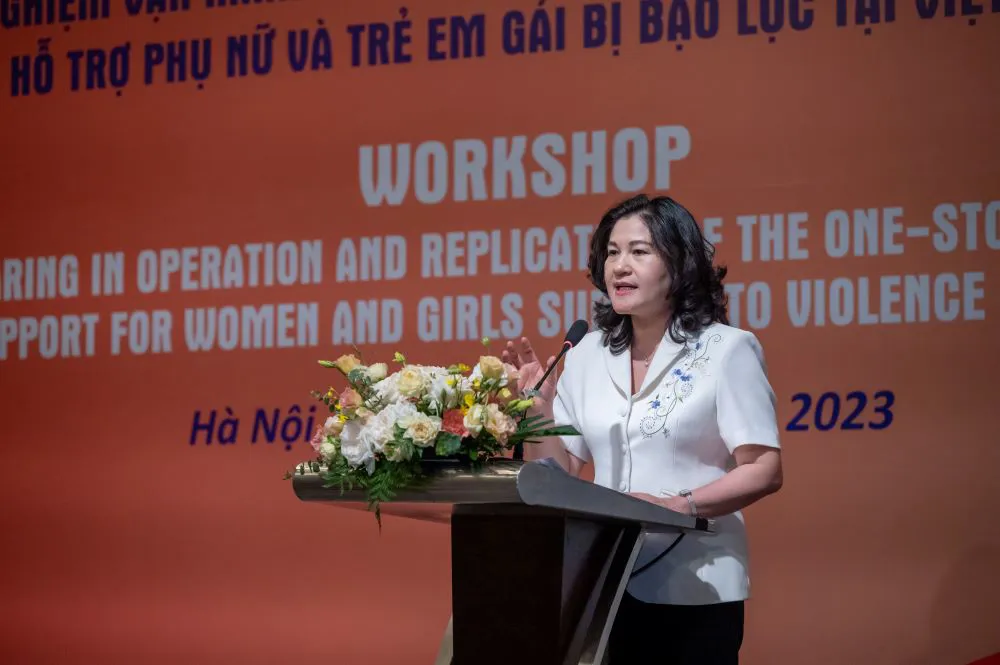One Stop Service Centers: Effective model for domestic violence victims in Vietnam
The model, which is supported by international partners, has been a reliable shelter for domestic violence victims in some parts of Vietnam over the past years.
One Stop Service Centers or known in Vietnam as Anh Duong House (Ngoi nha Anh Duong) can reach out to more and more women and girls who are experiencing and/or at risk of gender-based and domestic violence.
| Anh Duong House (Ngoi Nha Anh Duong) is One Stop Service Center for victims of domestic violence. Photos: UNFPA Vietnam |
The first-ever Anh Duong House was established in Quang Ninh in April 2020 through the Korean International Cooperation Agency (KOICA)-funded project “Building a Model to Respond to Violence against Women and Girls in Vietnam,” for the period of 2017 – 2021 with the total budget of US$2.5 million.
In 2022, three more Anh Duong Houses were opened in Thanh Hoa province, Danang City, and HCM City with financial support from the Government of Japan. The operational costs are thereafter covered through funding from the Government of Australia.
The Anh Duong House provides essential, comprehensive, and integrated services to targeted women and girls. It provides a wide range of services, meeting international standards, including health care, psychological support, counseling, social welfare services, emergency shelters, police protection, legal and justice services, and referrals.
All services provided at the OSSC are based on the survivor-centered principle, in which survivors are treated with respect and dignity, and assured of privacy and confidentiality.
Representatives from the four Anh Duong Houses reported that service providers at the One Stop Service Centers (OSSCs) have to work very hard in order to meet the high demands of local people, especially women and girls.
As of now, four Anh Duong Houses have directly supported over 60 gender-based violence (GBV) survivors at the houses and nearly 1,100 GBV survivors in the community. Particularly, the hotline of these houses has received and provided consultations and support to more than 20,000 calls from survivors of violence.
| Cho Han Deog, Country Director of the Korean International Cooperation Agency (KOICA) Vietnam, at the event. |
Cho Han Deog, Country Director of KOICA Vietnam expressed KOICA’s appreciation of the effective operations of the OSSC model in Vietnam and thanked UNFPA for its technical and financial support to ensure the availability and accessibility of the support services provided by Anh Duong Houses.
“KOICA sees gender equality as an integrated component of its ODA programs and projects. KOICA, UNFPA, and the Vietnamese Government successfully completed a project for building a model to respond to violence against women and girls in Vietnam from 2016 to 2020,” Cho Han Deog said.
He said since the model has been effectively contributing to bringing hope to the GBV victims, KOICA is willing to fund US$5 million more to replicate the model in Ha Tinh and Khanh Hoa provinces in the coming years.
| Nguyen Thi Ha, Vice Minister of Labour, Invalid and Social Affairs, addresses the vent. |
More efforts needed
There remain appropriate policies and guidelines needed to replicate and sustain the Anh Duong House nationwide.
It’s one of the conclusions of the workshop co-chair by the Vice Minister of Labour, Invalid and Social Affairs, Nguyen Thi Ha and the UNFPA Representative for Vietnam, Naomi Kitahara in Hanoi on May 26.
The workshop was part of the UNFPA Bridge Phase Project “The Follow-up Activities of Building a Model to Respond to Violence against Women and Girls in Vietnam, July 2022-June 2023,” which is funded by KOICA. The Project aims to ensure the sustainability of the innovative One Stop Service Center model or the “Anh Duong House” in Vietnam.
Vice Minister Nguyen Thi Ha highly valued the effective operation of the OSSC model introduced by UNFPA. She said discussions on the replication of the UNFPA-supported One Stop Service Centre model with other localities is a manifestation of the Government’s efforts to support GBV survivors by providing essential and integrated support services, taking GBV survivor-centered approach, thus contributing to addressing GBV in Vietnam.
She noted that to achieve this goal, it is necessary to develop a multi-sectoral coordination mechanism.
UNFPA Representative for Vietnam, Naomi Kitahara, confirmed that: despite the efficient operation of the four Anh Duong Houses, the demands are so high in terms of supporting GBV survivors. UNFPA, therefore, calls for the expansion and replication of this safe and reliable facility to other provinces and cities in the country.
| UNFPA Representative for Vietnam, Naomi Kitahara, speaks at the event. |
“In Vietnam, UNFPA wants to ensure that all women and girls in Vietnam, including those most vulnerable, have the right to live a life free of violence and with dignity. We are not leaving women and girls behind in the efforts of achieving SDGs by 2030,” she noted.
Participants in the workshop highlighted that to replicate the Anh Duong House in other localities, it is necessary to develop policies and detailed guidelines on the standards of the OSSC model and ensure the quality of support services provided. Such policies and guidelines also aim to further enhance the multi-sectoral coordination mechanisms among relevant departments and agencies at both national and local levels.
More support from the State management agencies and a regular allocation of budgets from the Government and from local authorities is also important to ensure the sustainability of the OSSC model. However, other organizations, individuals, and the private sector have to be mobilized for financial, technical, and human resources in providing essential services to support GBV survivors.
The workshop agreed that the replication of the OSSC model is entirely in line with Vietnam’s National Programme on GBV Prevention and Response 2021-2025 and the amended Law on Domestic Violence Prevention and Control, which was adopted by the National Assembly in November 2022, which highlight the need to establish effective models and facilities to prevent domestic violence and to support GBV survivors.




.jpg)







